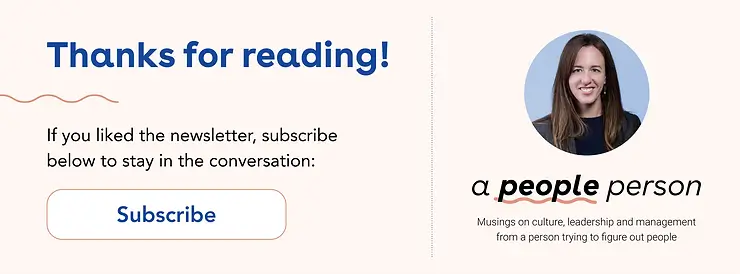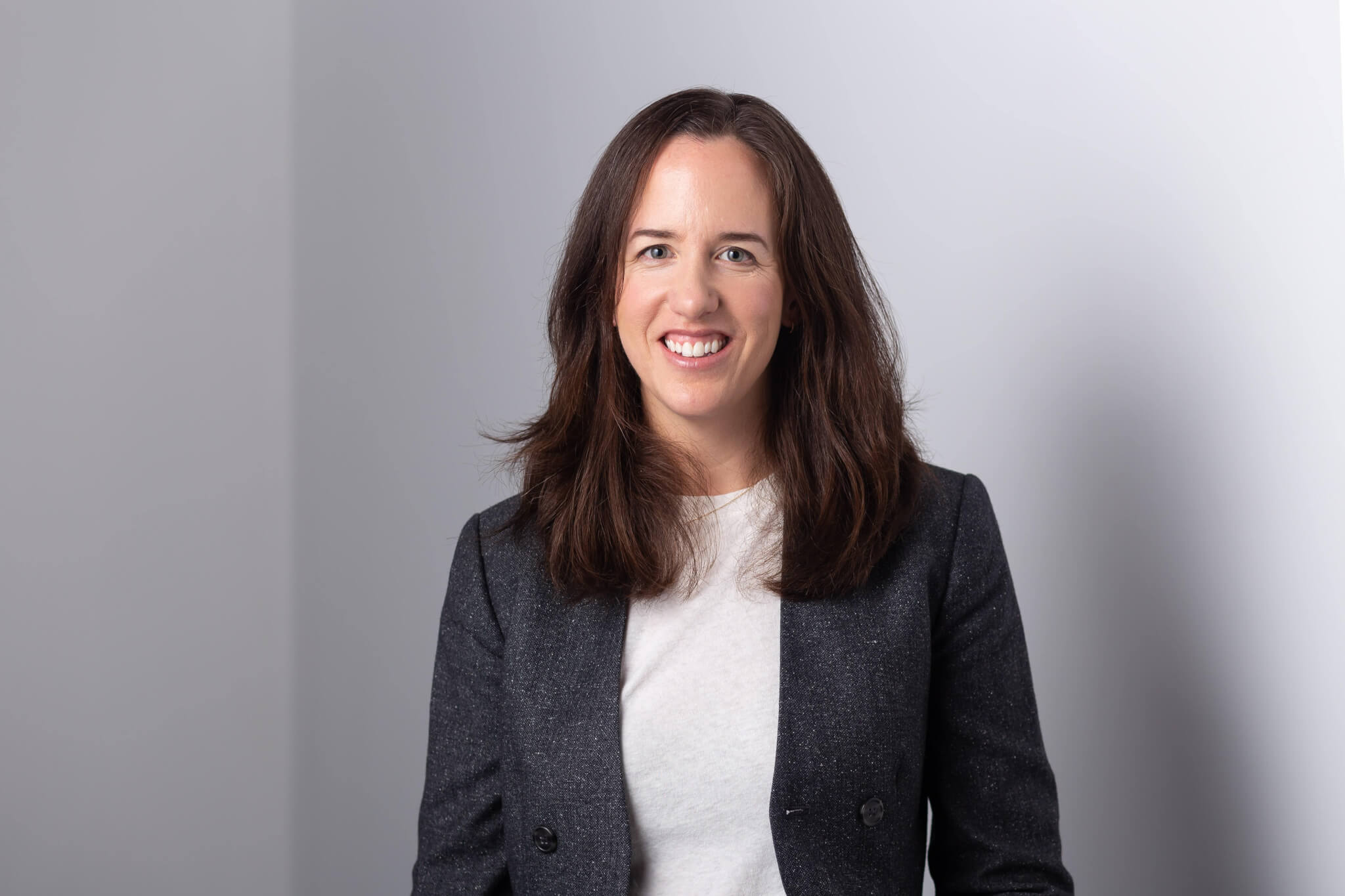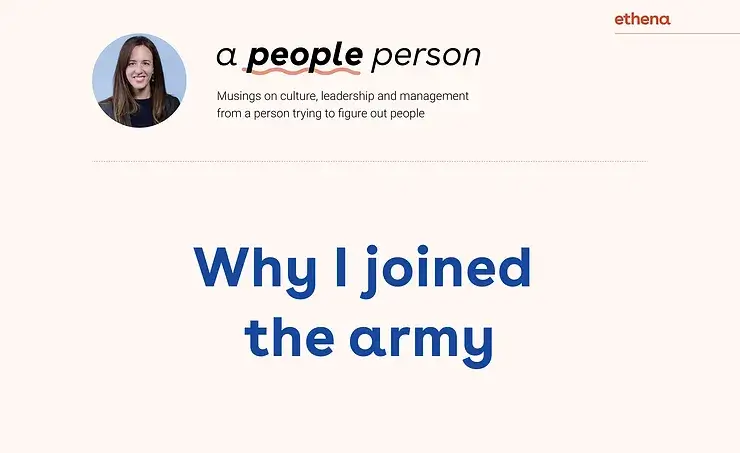Hi there,
If anyone comes to me for career advice, I generally respond to any question with, “It doesn’t really matter what you do.” That’s not because I’m nihilistic and believe capitalism is so broken that we should all check out/quiet quit.
It’s because my own experience with a windy, relatively random career taught me that it’s hard to plan. Since Veterans Day is this month (happy Veterans Day to everyone, especially my parents and father-in-law, all devoted readers), I figured I’d share my “how I ended up in the Army story” as a parable you can use when thinking about careers, both yours and those you lead.
WHY I JOINED THE ARMY
Are you joking?
Let’s go back to 2004. We’re all wearing low-rise jeans and using Napster. I had applied early to Harvard College and returned home from tennis practice to check my email (and probably download a song). I was supposed to hear from Harvard the following day, but figured I’d check, and low and behold, there it was: my admissions email. I was in!
I screamed, danced, and yelled for my parents. My mom joined my profanity-laced celebrations, but my very-Dutch father decided that this was the moment to deliver solemn news: congratulations daughter, now you must fund your education. (I will state for the record that family lore about the exact timing of his message varies, but you’re getting my version, which is to say, the truth.)
I was confused. How, dear father, will you pay for my education?
Anyway, as you can imagine, I had little negotiating power and thus, lost. If I wanted to go to an expensive school, I was going to have to pay for it. My dad had recently flown (he’s a pilot) with another pilot whose daughter was in the Navy Reserve Officers Training Corps (ROTC) and was, at least according to her father, having a good experience.
We settled on a compromise: I would join the Navy ROTC to get one year of Harvard paid for. Legend had it that if I quit before the first day of my second year, the Navy could not possess me, and I didn’t need to pay that first year back. So that was the plan. Get the Navy to pay for year one, then figure out the rest as we went.
I went to my high school guidance counselor to request a transcript for the Navy and she said, and I quote, “Are you joking?” I’d never expressed any interest in the armed services, and she could not see how this was going to work. But she handed over the transcript, and I applied and got the ROTC scholarship. Anchors away.
Not science, anything but science
I arrived at Harvard and started the ROTC program only to learn that the Navy prizes STEM students (science, tech, engineering, and math) above all others. I liked parts of the Navy – the physical fitness, the people, the scholarship money – but was deeply uninterested in having to take engineering or physics.
So one day, while wearing my Navy uniform, I walked into the Army’s part of the building and asked the officer if the Army required physics. He told me that there were two ground wars raging, so no, the Army wasn’t too picky about transcripts.
Well, that settled things and halfway through my freshman year, I switched from the Navy to the Army, where I got physical fitness, good people, and scholarship money, without having to take more math.
Hang out with good people
This is an absurd but true story about why I joined the military. And you might be asking, “Roxanne, where’s the bit about wanting to serve your country? All the lofty patriotism?” Sure, I had some vague notions about service, but I was also 19 – I didn’t really understand what these words meant and what sacrifice felt like.
But while I joined for the seemingly random reason of needing money but disliking physics, that’s not why I stayed in the Army. I stayed because I loved the people and I wanted to be like them when I grew up. I saw great leaders who were competent and selfless and cared about the mission more than themselves. I knew I’d be challenged and that if I could make it in the Army, I’d be able to handle most anything else (including running a startup while giving birth in a pandemic…for example).
I once asked an officer I admired how he became a good leader and he said he just hung out with good leaders, and it rubbed off.
So, as best I can tell, the point of this winding story is that it’s really hard to plan a career. I suppose I should have at least Googled whether the Navy required physics, but aside from that oversight, it’s hard to predict what’s going to be a good fit.
But if you work with great people, the good stuff rubs off, and that, more than specific skills or experiences, is what fuels a meaningful career. So if you’re looking for career advice, here it is: surround yourself with good people. Good people that are competent, selfless, that care about a mission more than themselves, and who challenge you.
What I'm listening to:
- You may have heard there’s a new requirement for salary transparency in New York City. We at Ethena have thoughts (positive ones)! Well, I listened to this episode of WSJ's podcast The Journal recently and was interested in the idea of how pay transparency can affect whether we’re team players or more individualistic showboats, as examined through the lens of hockey.
- Where do new ideas come from? That’s the topic of this podcast episode from a lecturer at Stanford Graduate School of Business on creativity. I liked the exercises they suggest for coming up with new ideas (force yourself to come up with a lot of them) and the concept that the best ideas come from combining seemingly different fields (for example, how my military experience helped me come up with a compliance startup).
What I am doing:
- Today, Thursday, November 17th, I'm hosting a CEO AMA with the CEO and Co-Founder of Pilot, Waseem Daher. We'll be talking about how to hire your company’s first operations (finance and HR) team. Share with any founders/company builders!
Happy Veterans Day,
Roxanne Petraeus
CEO & Co-founder, Ethena









